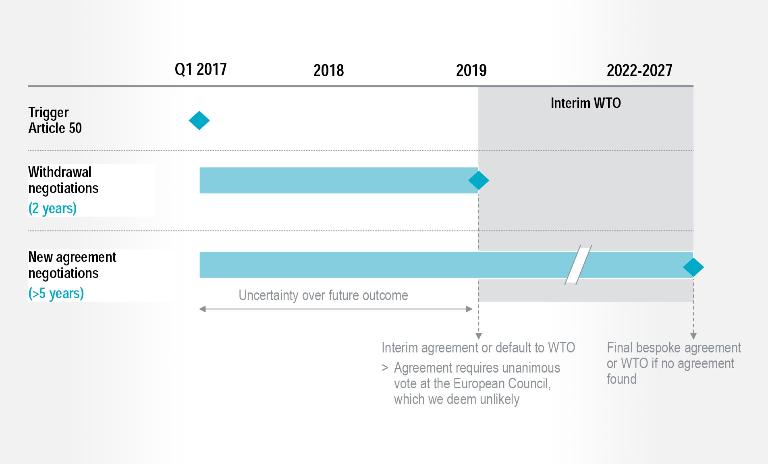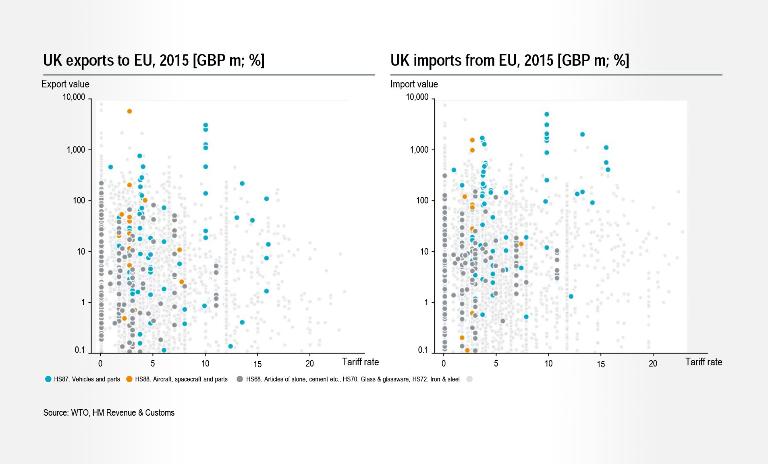

Brexit: Reassess your forecasts now
Like many Europeans following the political discussions in Britain, we at Roland Berger in London take it as a time for reflection. Does your post-Brexit 5-year forecast incorporate World Trade Organization (WTO) rules? They are complex, but navigable.
We view the current wave of populism through the lens of our Brexit work. This started with publications before the referendum, accelerated in the immediate aftermath with projects for companies whose very existence was jeopardised by Brexit, and is now settling into a steady state as one of the core strategic drivers for all of our UK industrial sector strategy work.

The second half of last year was an interesting "phoney war", in which most people in industry just carried on doing what they had always done. "Brexit conferences", of which there were many, our own breakfasts included, tended to involve professionals (almost all "Remainers") getting together in many and varied combinations to agree that a) the referendum should never have happened, b) "Brexit" was a mistake, c) if it were ever to actually happen, a soft Brexit was definitely preferable to a hard Brexit, and d) industry should definitely come together to lobby for access to the single market and free movement, (something it singly failed to do in the run up to the referendum, when the Brexit side notably outspent its lethargic establishment opposition).
"The first thing we believe all professional managers must now do is understand what the implications of WTO are for them. "
In short, we, the pro-"Remain" leaders of UK industry, have largely been guilty of confirmation bias, and of scrabbling to come to terms with being part of that new bogeyman "the metropolitan elite".
In the post-Trump world there is now a growing appreciation that this challenge is not simply going to go away.
The central theme of Roland Berger's advice to players with operations in the UK is now, and has been since the completion of our first phase of projects last September, a simple one. We believe that our clients should reassess their five-year forecasts, and recast the last two years to be based upon the most likely outcome. Most companies in our experience have not changed their plans at all, implying that the most likely market outcome in 2020 is the trade conditions we have had to date.
In contrast, we believe that plain vanilla WTO rules are the most likely, indeed the only predictable outcome at this time. While we are clear that the UK has disappointingly little influence over the type of Brexit it will face, hard, soft or otherwise, nothing we have heard from Theresa May or others has shaken this belief. Confirmation bias again? Perhaps, but we think not.

The good news of our prediction is that it leads to sensible, practical actions that can be taken to mitigate industry risks. Very few sectors face existential threat from WTO rules, and industry, while recognising the uncertainty of the range of possible outcomes, need no longer be paralysed by it or simply sit on its hands.
The first thing we believe all professional managers must now do is understand what the implications of WTO are for them. This is not trivial: there are over 4,000 discrete WTO tariff barriers, plus non-tariff barriers, which for most sectors are even more material. However, this is a credible project to undertake.

Armed with an understanding of the financial impact of tariffs, and of the key non-tariff barriers faced, businesses can then go about mitigating their risks.
In some instances this will be best done through relocation, supply chain reassessment or new investment decisions with potential to have an impact within the two years before the divorce settlement takes effect. In others it will require structural change or lobbying, such as that intimated in the May government's discussion of industrial strategies, and will have a more protracted timeframe.
Especially illuminating in such analysis is the impact of non-tariff barriers, for example the administrative burden and working capital implications of customs inspection, or the regional impact of immigrant workforces. In all cases we have seen to date, the combined effect of tariff and non-tariff measures requires sober and clear-headed judgement, and has a material impact, ranging in the sectors we have worked in from 2 to 14% of sales.
We believe that the experience and models we have developed in "bleeding edge" sectors like automotive are now valuable to all UK industrial concerns.

